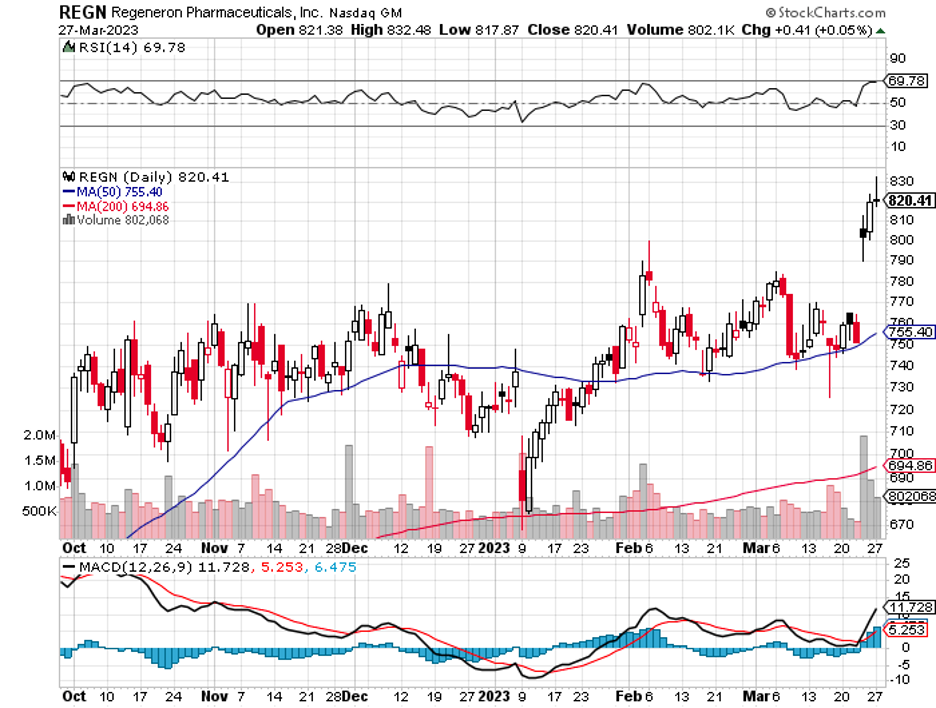Nowhere To Go But Up
For any biotechnology company, one of the critical elements of success is the capability to create and develop new and innovative treatments.
That is one requirement Regeneron (REGN) has no trouble meeting.
The latest update from this biotech involves its blockbuster asthma medication, Dupixent. The top-selling drug delivered promising results from a study that aims to expand its indication, signifying the potential for additional billions of dollars in revenue.
According to Regeneron and its co-developer, Sanofi (SNY), the Dupixent trial on current or previous smokers displayed a 30% reduction in moderate or severe acute exacerbations of chronic obstructive pulmonary disease (COPD).
COPD is a lung condition that makes it difficult for air to move in and out of the lungs due to the narrowing of the airways. It's is caused by long-term exposure to irritants such as cigarettes, coal, and other pollutants. It can be fatal and life-threatening. There is no cure for COPD, but treatments may help improve symptoms and slow down the progression of the disease.
The market for COPD is estimated to grow significantly over the next five years due to the increasing prevalence of COPD and related comorbidities, such as asthma, cardiovascular diseases, and diabetes.
Additionally, factors such as continuous growth in the elderly population and the introduction of novel therapies are likely to drive the growth of this market during the forecast period. The global COPD market was valued at $27 billion in 2018 and is expected to reach $50 billion by 2025 with a compound annual growth rate of 8.5%.
Considering Dupixent’s positioning in the market and the competitors for this segment, Regeneron is projected to rake in an additional $4 billion in sales from this expanded COPD indication. Taking all its indications together, this blockbuster drug is estimated to contribute a whopping $19.2 billion in the company’s sales.
Aside from Dupixent, Regeneron has also aggressively expanded the indications for another blockbuster drug, Eylea.
In February, the company submitted its application to the Food and Drug Administration to allow them to administer Eylea in 8-milligram doses.
Eylea is a medication used to treat wet age-related macular degeneration (AMD), diabetic retinopathy, and diabetic macular edema. This treatment is typically administered via an injection into the patient’s eye once every two or four weeks, depending on their condition.
In terms of revenue, the wet AMD market is expected to grow significantly over the following years. This growth is driven by the climbing number of cases and the prevalence of associated comorbidities like diabetes and hypertension. In 2018, the global wet AMD market was valued at $17 billion. This number is anticipated to reach $28 billion by 2025.
Going back to Regeneron, the company’s move to increase the formulation of Eylea from 2 mg to 8 mg is critical. This will enable patients to undergo fewer injections of the treatment from 8-week intervals to 12- and even 16-week intervals, which would be a key selling point.
Another excellent reason behind this move is that Eylea’s patent expires in 2023, making it a target for biosimilar competitors. Regeneron’s decision to switch to a higher dosage formulation is a strategic way to sidestep this impending concern.
On top of blockbusters Eylea and Dupixent, Regeneron is also charging headlong on efforts to expand its immune-oncology franchise. Its top treatment in this field, Libtayo, is slated for multiple clinical trials to expand its indication. In addition, Regeneron has seven or so candidates queued in this lucrative but crowded space.
While Roche (RHHBY) has more candidates than the biotech in the immuno-oncology field, Regeneron’s speed in capitalizing on opportunities in this fast-advancing sector is nothing short of breathtaking. Given that immuno-oncology is a relatively new segment, the company’s ability to deliver promising results enables it to stand out in the biotech world.
Regeneron is a beacon of stability in an otherwise unpredictable industry, steadily ascending since its inception. But the stock’s continued success isn't just luck. Their past successes with their treatments and medicines have placed them on solid ground to continue advancing, while further wins through the widening use of approved drugs have only reinforced that position - setting up Regeneron for continued growth into the future.


